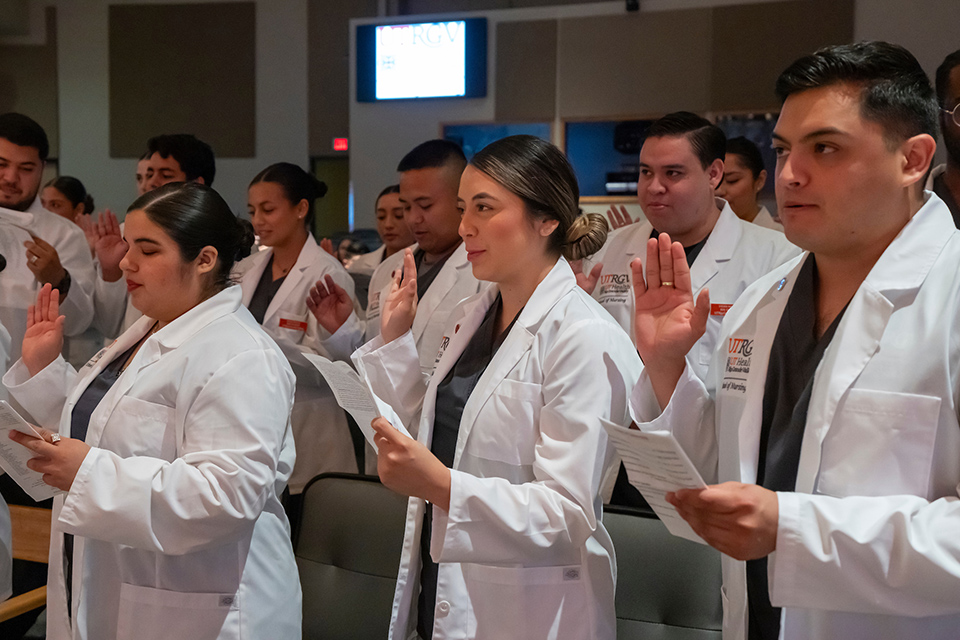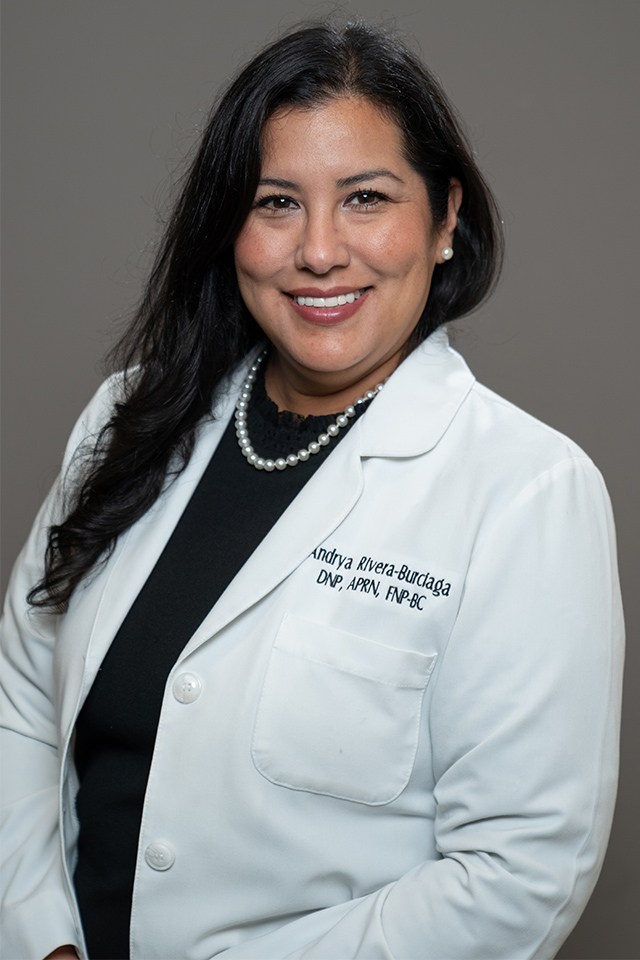By Karen Villarreal
RIO GRANDE VALLEY, TEXAS – MAY 9, 2025 – Death, for the most part, makes people uncomfortable.
But not UTRGV’s Dr. Andrya Rivera-Burciaga.
After a personal loss early in her nursing career drove her to seek advanced certification in hospice and palliative care, she has made it her life’s work to normalize conversations about death and dying.
“We're all going to die,” says Rivera-Burciaga, coordinator for the Doctor of Nursing Practice program at UTRGV and a Ph.D. student in the UT Health San Antonio Nursing Science program. “The big question is, how do we preserve our dignity when the time comes?”
The Valley has very few experts in palliative, or “comfort” care, Rivera-Burciaga said, and she felt the absence of specialized care when her grandparents were hospitalized, her grandfather with end-stage liver disease and her grandmother with advanced dementia.
“Palliative care aims to improve a patient’s quality of life,” she said. “Beyond physical symptoms, it means guiding the patient and their family through the psychological or spiritual distress of death and bereavement.”
At the time her grandparents were hospitalized, she was trained as a nurse yet felt utterly unprepared to guide them through their active phase of dying.
“How we practice grieving and loss was not in the textbook at that time,” she said. “I remember thinking, ‘I should have been able to help my family, as a nurse.’”
It was a heartbreak that became Rivera-Burciaga’s momentum, her drive to do research, to teach and to advocate in a way that helped nursing students learn how to bring comfort, dignity – even beauty – to life’s final chapter.
While Rivera-Burciaga’s efforts successfully have woven palliative care into the UTRGV nursing curriculum, her Ph.D. research on the unique cultural perspective of death and dying among Mexican Americans aims to further tailor the care that nurses provide to end-of-life patients in South Texas.
NURSING EMOTIONAL WOUNDS
Through clinical interviews, Rivera-Burciaga found that many individuals of the Mexican American culture are afraid to die – despite engaging in Día de los Muertos, a celebration of death every November.
“We've built a compassionate community for the dying, yet we don't say it by name. Many Mexican Americans in the United States believe that to talk about death invites it. Or, that we don't have time to be depressed, or that even in mourning men don't cry,” she said.
The palliative care experience – a holistic approach that addresses the body, mind and spirit – can help a patient and their family ease some of those psychosocial, emotional and spiritual fears that come with living with a serious illness, she said.
That might include expressing their unspoken emotions by writing letters, saying goodbyes and specifying what’s important to them for their final days.
“Nurses, doctors, social workers and chaplains work as a team in palliative care to make the dying experience for a patient a beautiful one,” she said. “Sometimes, our goal is to get a referral to hospice sooner, so the patient and their family have more time to start on that process.”
ADVOCATING THROUGH THE END
Rivera-Burciaga realized the need to expand beyond traditional medicine’s focus in her community. While working at a local hospital, she traveled as much as possible to End-of-Life Nursing Education Consortium (ELNEC) seminars, becoming “train-the-trainer” certified to host her own sessions on hospice and palliative care using their curriculum.
Her efforts in this aspect of care led the hospital to invest in building an inpatient palliative program, recruit physicians to staff the program and establish a 25-bed, free-standing hospice.
“I was blessed to meet people who believed in me, and my dream to provide high quality hospice and palliative care for the patients of South Texas,” she said.
It was a small comfort that when her parents passed, they were in the same hospital where she had worked so hard to build an end-of-life program.
“I knew everything they wanted,” she said. “But COVID-19 robbed me of giving my mom and dad that beautiful dying experience – what I had done for thousands of patients.”
A nonprofit, endwellproject invited Rivera-Burciaga to speak about her complicated grief as a daughter and as a healthcare worker. That led to her being invited to participate on national advisory boards that focus on raising awareness to advance hospice care.
“I was happy when the American Association of Colleges of Nursing (AACN) deemed palliative care an essential competency in 2021," she said.
Rivera-Burciaga started working with Nancy Nadeau, director of BSN Programs, to teach ELNEC concepts to undergraduate nursing students.
Dr. Merlyn Palacios, also an advanced certified hospice nurse practitioner and UTRGV clinical assistant professor, contributed at the graduate level.
“I love teaching about the caring aspects of dying, but I can’t do all the work myself, so I’m excited that more faculty are now training in this aspect of care,” Rivera-Burciaga said. “Educating the next generation of nurses to care for the dying is vital.”
ABOUT UTRGV
The University of Texas Rio Grande Valley (UTRGV) was created by the Texas Legislature in 2013 as the first major public university of the 21st century in Texas. This transformative initiative provided the opportunity to expand educational opportunities in the Rio Grande Valley, including a new School of Medicine and a School of Podiatry, and made it possible for residents of the region to benefit from the Permanent University Fund – a public endowment contributing support to the University of Texas System and other institutions.
UTRGV has campuses and off-campus research and teaching sites throughout the Rio Grande Valley including Brownsville (formerly The University of Texas at Brownsville campus), Edinburg (formerly The University of Texas-Pan American campus), Harlingen, Weslaco, McAllen, Port Isabel, Rio Grande City and South Padre Island. UTRGV, a comprehensive academic institution, enrolled its first class in the fall of 2015; the School of Medicine welcomed its first class in the summer of 2016, and the School of Podiatric Medicine in the fall of 2022.


